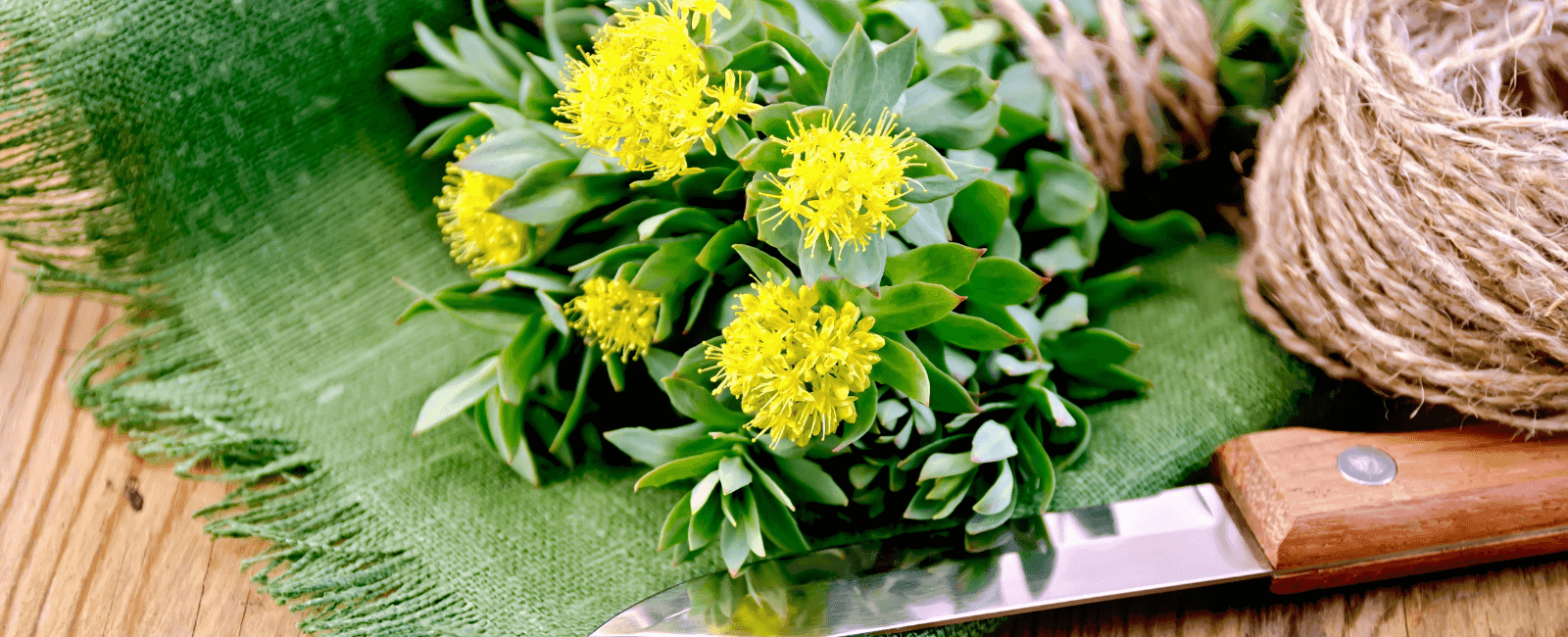

At a time when so many of us are burning the candle at both ends, wouldn’t it be amazing if there was a way to boost our physical and mental strength naturally? With so many herbal supplements out there, it can be difficult to find a natural remedy to suit the ever-changing needs of our bodies. Fortunately, the root of the Rhodiola Rosea plant is an excellent option for those seeking adaptogenic benefits for both their bodies and minds.
Rhodiola Rosea as an Adaptogen

The word adaptogen was coined in the 1940s by Soviet physician Nicolai V. Lazarev to describe any plants and mushrooms that promote overall well-being and help us respond with resilience to the curveballs life can sometimes throw our way. At the time, the Russian government commissioned Lazarev to find a medicine that would keep their population strong and healthy during WWII and The Cold War that followed. Since those days, experts have established the three key characteristics of an adaptogen:
- Non-toxic when taken in normal doses
- Helpful in dealing with stress
- Returns the body to a balanced state (homeostasis)
Rhodiola Rosea (also known as arctic root or golden root) is an adaptogenic herb native to the frosty high-altitude regions of Europe and Asia. Studies show that plants fighting to survive in harsh conditions are rich in antioxidants and other beneficial compounds (1). When we eat them, we become more resilient, just like them. The most notable part of Rhodiola is its roots, with more than 140 active ingredients. The most potent of these are the adaptogenic compounds rosavin and salidroside, which studies found to have anti-depressant qualities and a positive impact on improving cognition (2).
Those living in ancient Russia, Scandinavia, and Asia didn’t need to know the scientific names of Rhoiola’s active ingredients. They just knew it was beneficial to their health because this enchanted herb had been an important part of their traditional medicine for centuries. Known for its versatility, Rhodiola Rosea has traditionally been used to treat a variety of health ailments. According to folk medicine, Rhoiola’s benefits include anti-aging purposes, immune system support, stress tolerance, physical endurance, high altitude sickness, and so much more. Young Siberian couples even used to carry Rhoiola in their wedding bouquets as a symbol of fertility.
Benefits of Rhodiola Rosea

Today, several evidence-based studies on Rhodiola show that the benefits of Rhodiola extend to several of our body’s systems. When used as a regular dietary supplement, Rhodiola demonstrates many important health benefits.
Nervous system
In one placebo-controlled clinical trial of ninety-one participants with mild to moderate depression, members of the treatment group showed marked improvements in their overall emotional well-being at the end of six weeks (3).
The adaptogenic effects of Rhodiola Rosea are tied to its ability to keep steady amounts of neurotransmitters (like serotonin and dopamine) circulating through our bodies and minds. An imbalance in any of these chemical messengers can throw off our equilibrium, making us more vulnerable to excessive stress or the effects of mental health conditions such as depression and generalized anxiety disorder. Hormones and neurotransmitters are two different types of substances our bodies produce, and their job is to carry signals from one part of the body to another. For example, serotonin is often called the body’s “feel good” chemical because it helps to regulate our mood. Ninety percent lives in our guts as a hormone, and the other ten percent lives in our brains as a neurotransmitter. When serotonin is at normal levels, we feel more focused, even-keeled, happier, and calmer. As a result, Rhodiola can have antidepressant-like effects with its ability to regulate serotonin levels in the body. Rodolia can also lower stress hormones like cortisol, which can help reduce chronic fatigue that leads to burnout (4).
In another study, students who were given Rhodiola during their final exam period experienced increased productivity, cognitive function, and muscle memory. As a result, they were slower to fatigue or have performance anxiety (Stojcheva, Quintela 2022).
Cardiovascular system
Rhodiola’s positive effects are not limited to the nervous system and mental performance. The herbal supplement is also known for its ability to improve athletic performance.
Rhodiola supplements support the production of red blood cells (RBC), which carry oxygen to our muscles — enabling us to exercise more intensely and for longer periods of time. Rhodiola’s anti-inflammatory properties can also shorten the downtime spent in recovery due to muscle soreness and fatigue. So, for those who want to level up our workout routines, Rhodiola can give us that extra edge to make it happen.
Plus, did you know that stress can turn up inflammation in the body and lead to heart disease? Studies show that Rhodiola Rosea protects our hearts by stabilizing pulse rates and preventing stress-related damage. Considering that heart disease is the number one cause of death globally, supplementation with Rhodiola can significantly impact the quality of life and lifespan of many millions of people.
Reproductive system
Siberian newlyweds were really onto something with those fertility bouquets because several studies point to Rhodiola Rosea’s capacity to restore the menstrual cycles of women experiencing amenorrhea. Additionally, Rhodiola can enhance sexual and reproductive function in both women and men (Stojcheva, Quintela 2022).
Stress can be an underlying cause of so many different conditions and is often overlooked in matters of hormonal imbalance. Through its ability to promote a relaxation response, Rhodiola can help us move through many of life’s phases more easily.
Some reports have shown that women of childbearing age who struggled to conceive with IVF were able to become pregnant after taking Rhodiola. Animal studies have also demonstrated a strong connection between supplementation and fertility.
At the other end of the spectrum, women going through menopause can also benefit from Rhodiola supplementation. Clinical studies have shown significant improvements in women’s emotional and physical symptoms when Rhodiola is used in combination with an herb called black cohosh (Pkhaladze et al. 2020).
For the men out there reading this, you, too, can benefit from Rhodiola! Rumor has it that the Vikings’ athletic prowess was connected to their consumption of Rhodiola. If rumors aren’t enough to sell you on this herb, how about some science? In one study of men experiencing erectile dysfunction and/or premature ejaculation, 26 of the 35 men saw significant improvements in sexual function and increased 17-ketosteroids (a sex hormone that tends to wane as we get older) in their urine (5).
Best way to take Rhodiola supplements

Like most true adaptogens, Rhodiola is extremely safe when taken over long periods of time. Since not all Rhodiola supplements are created equally, look for a root extract with at least 3% rosavins and 1% salidrosides.
- Recommended dose: 100 to 600 mg per day.
- Tips: Although uncommon, Rhodiola can keep you up at night when taken in high doses. It is best to take it early in the day, in two divided doses, on an empty stomach. Even though it is well tolerated by most, some people report mild side effects like dry mouth, headache, dizziness, and nausea. If you experience these symptoms, try taking the supplement with some food.
- Caution: Avoid if you have manic depression or are bipolar. Rhodiola is not recommended for pregnant or breastfeeding women.
In a nutshell, Rhodiola Rosea promotes harmony of the body and mind from the inside, which helps us adjust to ever-changing conditions happening on the outside. When we feel less stressed, we can function at higher levels — both physically and mentally. So, whether you are looking to boost your energy and vitality or improve your mood and overall resilience to life’s stresses, Rhodiola supplements can help you get there.
References
- Hashim, Ahmed M., Basmah M. Alharbi, Awatif M. Abdulmajeed, Amr Elkelish, Wael N. Hozzein, and Heba M. Hassan. 2020. “Oxidative Stress Responses of Some Endemic Plants to High Altitudes by Intensifying Antioxidants and Secondary Metabolites Content.” Plants 9 (7): 869. https://doi.org/10.3390/plants9070869.
- Dimpfel, Wilfried, Leonie Schombert, and Alexander G. Panossian. 2018. “Assessing the Quality and Potential Efficacy of Commercial Extracts of Rhodiola Rosea L. By Analyzing the Salidroside and Rosavin Content and the Electrophysiological Activity in Hippocampal Long-Term Potentiation, a Synaptic Model of Memory.” Frontiers in Pharmacology 9 (May). https://doi.org/10.3389/fphar.2018.00425.
- Ivanova Stojcheva, Emilija, and José Carlos Quintela. 2022. “The Effectiveness of Rhodiola Rosea L. Preparations in Alleviating Various Aspects of Life-Stress Symptoms and Stress-Induced Conditions—Encouraging Clinical Evidence.” Molecules 27 (12): 3902. https://doi.org/10.3390/molecules27123902.
- Olsson, Erik, Bo von Schéele, and Alexander Panossian. 2008. “A Randomised, Double-Blind, Placebo-Controlled, Parallel-Group Study of the Standardised Extract SHR-5 of the Roots OfRhodiola Roseain the Treatment of Subjects with Stress-Related Fatigue.” Planta Medica 75 (02): 105–12. https://doi.org/10.1055/s-0028-1088346.
- Brown, Richard P., Patricia L. Gerbarg, and Zakir Ramazanov. n.d. “HerbalGram: Rhodiola Rosea: A Phytomedicinal Overview.” Herbalgram.org. HerbalGram. Accessed February 13, 2023. http://cms.herbalgram.org/herbalgram/issue56/article2333.html?ts=1492616880&signature=6fa2087cf82b321d6a5223f04195653e&ts=1675275362&signature=2fd46ea7b110b620c4d658bb0dbbc9b2.


